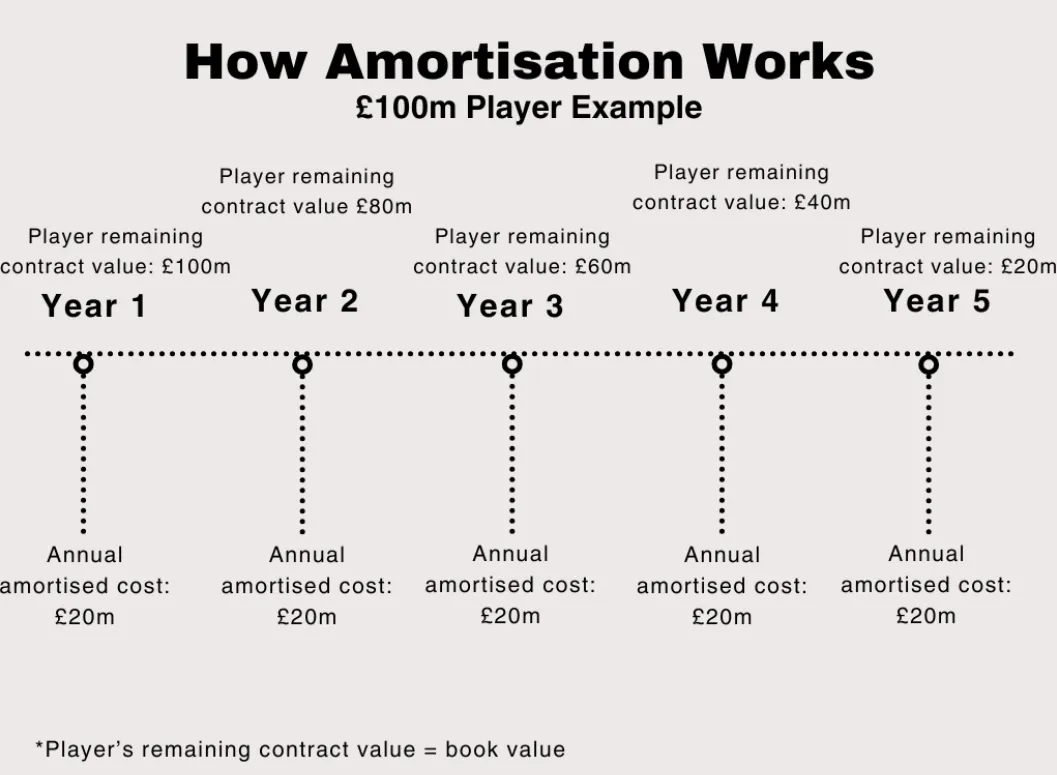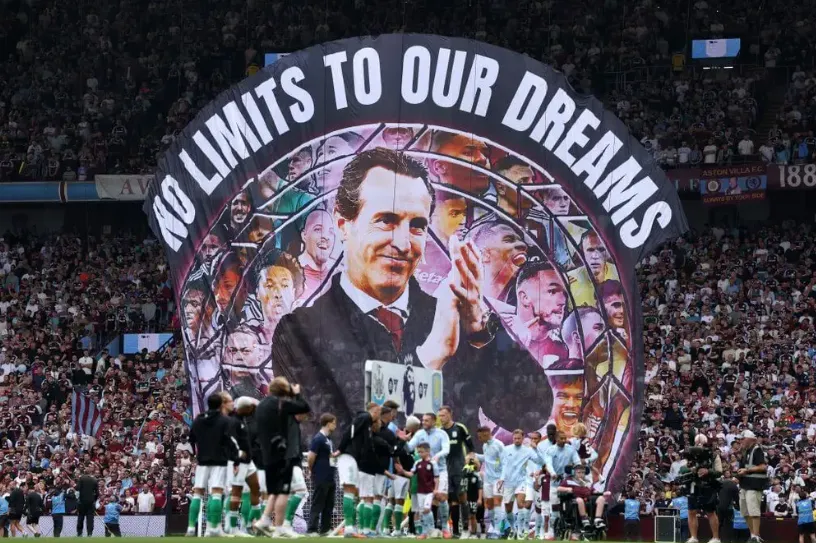The financial rules enforced by the Premier League and UEFA have been a major talking point in this transfer window for Aston Villa. The Villans have enjoyed three consecutive seasons finishing in the top 7 and now enter their third year competing in a European competition. You'd think they'd be able to spend reasonably well as a reward for their success, in order to continue to compete at the top. However, the financial rules in place, especially the Premier League's Profit and Sustainability Rules (PSR), have restricted them massively, even causing Villa to have to sell first-team players each season to comply.
This is also the trend for clubs like Newcastle and Nottingham Forest who, like Villa, are trying to break into the top 6 and compete in Europe regularly. These clubs are having to sell key assets before being able to improve the quality in their squads. The bigger clubs like Manchester United and Chelsea however, can spend huge amounts of money on players without the need for large sales. So why is this the case? - revenue. Clubs with large revenue have the freedom to spend. They have been established near the top for many years so their revenues are far superior to clubs climbing the table. Rising clubs simply can't compete financially with the "Big 6" leaving them with a disadvantage each transfer window.
Let's breakdown the financial rules and the complications of complying with them all.
Premier League's Profit and Sustainability Rules (PSR)
In simple terms, PSR states that clubs are allowed to lose a certain amount of money over three seasons before they are penalised. This figure is £105 million. Penalties can include point deductions, which Everton recently faced, or fines. Losses include transfer fees, players' wages and manager pay-outs. Investment in infrastructure, youth football and women's teams is excluded.
When it comes to transfer fees, clubs use a process called amortisation when buying a player. Clubs don't record the full transfer fee as a loss in one year, the fee is amortised across multiple years. For example, if a club signs a player for £50 million and signs a five-year contract, the loss for each year is £10 million until the fee is fully paid. If that club decides to sell that player for £40 million after two years, a profit of £10 million is recorded because the player's contract value has decreased to £30 million, as £20 million has been amortised from the original transfer fee.

In the past two seasons, we have seen loopholes develop - academy players swaps and selling to parent companies. When academy players are sold, they are recorded as "pure" profit. For example, Chelsea and Aston Villa have been culprits of academy player swaps. Chelsea sold Ian Maatsen to Villa for £37.5 million, whilst they bought Omari Kellyman for £19 million. Both clubs were allowed to record each of those sales as "pure" profit on their books as they both came through their respective academies. Seems a negative consequence of the rules right? Well they sort of encourage this to help with compliance!
Chelsea and Villa have both utilised another loophole in selling to their own parent company. The Blues sold their women's team for nearly £200 million and two hotels for £76.5 million to their parent company BlueCo. Meanwhile Villa also sold their women's team for £55 million to their parent company V Sports, whilst also selling a 10% stake to an external US investor. These deals helped both clubs avoid breach of PSR. The rules allow for this to take place, although the Premier League have previously attempted a motion to restrict intra-group asset sales, though it never reached a formal vote.
Considering PSR was implemented to promote financial stability and sustainability within the league. As well as create a more level playing field and protect the league's integrity. It's quite evident that it doesn't do any of that. In fact it really widens the gap between the highest earners and the rest of the league.
UEFA's Financial Rules
UEFA have a slightly different set of financial rules for Premier League clubs competing in a European competition. It's called Football Earnings Rule. This rule states clubs can lose no more than €60 million (£51.6m) across a three season period, plus a possible €30 million per year if European football’s governing body deems them to be in a ‘good’ financial standing. This is quite similar to the Premier League's PSR. However, the heads of European football have said their rules are not designed to create a level playing field, but rather force clubs to live within their means. Similar rules to PSR, but with a different purpose which perhaps makes the Premier League's reasoning for creating PSR even more flawed.
UEFA also have another set of rules called Squad Cost Ratio (SCR), which for this transfer window has been Aston Villa's main focus point. This season, clubs can only spend 70% of their revenue on transfer fees, wages of players and staff, agent costs and fees paid to pay-off former players and managers. The previous two seasons it was 80% then before that 90%. For clubs already at the top of the Premier League, this isn't really an issue as their revenues are huge. However, for Villa and Newcastle, who are trying to break into that mould, their revenues are far less so their ratio is higher. Last season Villa's wage bill was around 85% of their overall revenue, which caused them to be fined by UEFA as they needed to get below 80%.
Differently to PSR, UEFA do not recognise the selling of women's teams to parent companies as an avenue to comply. This means clubs have to focus more on selling players to reduce their wage bills or raise their revenue which is difficult to do in a short space of time. Another difference is that PSR runs from season to season, whereas SCR runs from January to December, making it more difficult for clubs to comply with both.
Villa Voicing Their Concern
Since Unai Emery's arrival at Villa, his two closest friends and colleagues in Damian Vidagany, Director of Football Operations, and Monchi, President of Football Operations, have spoken out at the unfairness in the rules, especially PSR. They feel as if Villa are being held back from being able to improve their squad in order to compete at the highest level. Whilst clubs like Manchester United can spend freely despite being millions of pounds in debt.
One year later, every words comes stronger: we keep fighting this situation to deliver a good team and comply with PSR and UEFA rules. As difficult it is, we won’t give up..( Thanks and good luck JJ) 👇🏻 https://t.co/nQ28uFFVVm
— Damian Vidagany (@DV1874) August 17, 2025
Last year, Vidagany spoke on TalkSport about the struggles of trying to comply with both PSR and SCR. He reiterated those concerns in the X post above, following the confirmation of the sale of Jacob Ramsey to Newcastle. His message, alongside Tyrone Mings' Instagram story and John McGinn's post, implied that Ramsey's sale was forced due to the need to comply with the financial rules despite Villa not wanting to sell the home-grown talent.
These comments from Tyrone Mings and John McGinn regarding Jacob Ramsey’s move to Newcastle from Aston Villa are remarkably pointed. You very rarely see players actively coming out and alluding to behind the scenes stuff like this on social media. pic.twitter.com/e042VZog8U
— HLTCO (@HLTCO) August 18, 2025
It's clear that Villa are furious with PSR bearing in mind the sales of key players they have made in the last two seasons. Douglas Luiz was sold to Juventus for £42 million last summer so Villa could comply with PSR. Moussa Diaby was sold for £50 million to Al Ittiahd to help with SCR. In January, Jhon Duran was sold to Al Nassr for £64 million to aid PSR again. Now Jacob Ramsey has been sold for £40 million also because of PSR. Granted Villa have also bought players, but they have needed to as they can't not replace these outgoings.
In the match against Newcastle on Saturday, Villa revealed a tifo as the players walked out. It was Emery smiling and clapping, with his players in the background, among them, Ramsey. Above, the caption: “No limits to our dreams.” An inspiring message reminding supporters that Villa will continue to grow and succeed under Emery.

It's a powerful message, although one that perhaps has been contradicted by the departure of Ramsey due to the limitations of the financial rules and Emery's notes in the match-day programme.
"We cannot avoid that the summer has been challenging because the financial rules were conditioning our investment - and our squad. This is a situation that we knew, we accept with full responsibility and we will overcome trying to work harder and be accurate in our decisions."
"Financial control rules came to football to avoid bankruptcies and payment defaults with a good purpose. But as professionals we should review it, as this good tool will become a limitation for clubs that are doing good management, who’ll never be allowed to dream and get higher goals because the revenue, key for these financial rules, needs time to come to reality after sporting success."
Villa are debt-free and their owners want to invest in Emery's squad, but they are shackled. If the rules stay as they are then the cycle will continue. The gap between the top 4 and the rest of the league will widen even further and it will be the same clubs battling it out whilst others watch on.
There is a small light at the end of the tunnel. Next season the Premier League aim to implement their own Squad Cost Ratio rules. Instead of the 70% threshold UEFA have, it will be 85%. PSR will be scrapped. This will loosen the restraints on Villa and make it slightly easier for clubs challenging the top 4 to invest in their squad and spend more than they currently are able to do.
The rules need changing and perhaps this is a step forward, but when will football stop focusing on money and rather the enjoyment of supporters watching. Will it ever?




